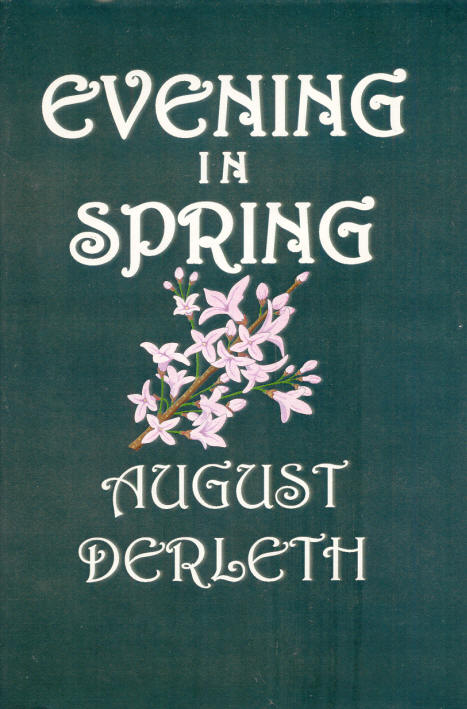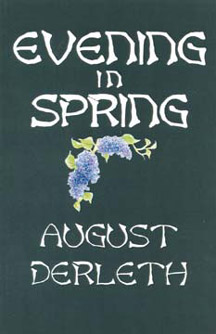



Paperback, 304p.
ISBN 1-55246-007-X @ $18.00
Hard Cover, 304p.
ISBN 1-55246-006-1 @ $28.00
Foreword by August Derleth
A long time ago, it seems (the year was 1925), when I had written forty
stories, none of which had sold, I thought it time to take stock. I looked over
everything I had written most of it pretty bad and selected one story which I
thought might be sold. The result was felicitous. Now that I have written and
seen published forty books, I have taken stock again in an effort to determine
which one of those forty books I would most like to see kept in print and, if
possible, given to a wider reading public.
I think it cannot be gainsaid that perhaps my best work is in non-fiction,
Village Year: A Sac Prairie Journal; and that perhaps next to it stands
Country
Growth, a book of short stories. But then, certainly, the unbiased reader must
find it difficult to avoid listing Evening in Spring. As a result of taking
stock in the late summer of 1945, I have only reaffirmed a conviction I have
entertained for a number of years; it is that Evening in Spring is without
question my best novel, and surely among the top five books I have done.
I do not mean to say that Evening in Spring is a perfect novel; by no means. I
have no illusions about my ability to write a perfect novel. But it is my best
novel, nonetheless, not only because it is nostalgically autobiographical, but
because its people are far more human than those in any other novel I wrote
prior to its publication, and most of them which have come since. If I indict a
brief for The Shield of the Valiant, it is perhaps because this novel is
actually in a very real sense a continuation of Evening in Spring.
It might very well be argued that my preference for Evening in Spring lies in
the fact that, since all writing is by way of being ego-extension, an
autobiographical novel such as this would very naturally be close to the author.
I think that is very far from being all the story; the variety and scope of my
creative activities have been such as to afford me a healthily unprejudiced
perspective insofar as my work is concerned, and the autobiographical aspect of
Evening in Spring has not operated to the detriment of that perspective.
Among my forty books, Evening in Spring is the only one which I can take up and
read through with unalloyed pleasure and uninhibited laughter. It contains
perhaps my best character that is, in the sense of being memorable Grandfather
Adams. It contains a great many other characters taken from the life, characters
whom I regard with the kind of possessiveness which causes me to start when I
meet them on the street, but all of whom I esteem for what they are as much as
for what they and their kind represent in village life in America. It seems to
me free of all artifice, which certainly cannot be said of its predecessors and
most of its successors, and it has an intensity and a sincerity which are only
incidental and occasional in others among my novels. It sprang full-bodied from
heart and head, having been written in twenty days early in 1941, the same year
of its initial publication by Scribner's.
Critics and reviewers were on the whole very kind to Evening in Spring. Such
doubt as was expressed, however, concerned the credibility of the family
characters. Insofar as an author has failed to make his characters credible,
such criticism is legitimate; but the other side of this coin is very often a
refusal of the reviewer to accept as real characters outside his own experience.
The questionable characters are, in fact, not only from the life, but actually
toned down; and the dubiety expressed left me in the position of reflecting that
the reviewers ought to know those characters I left out of Evening in Spring.
Take, for instance, the Aunt Clara of this book.
That was not her name in life, of course for Aunt Clara has gone on her last
visit. In the year of initial publication of Evening in Spring, another relative
underwent a major operation in Aunt Clara's home city. The family naturally
assumed that Aunt Clara, with her yen for visiting, would camp at the hospital,
but there was apparently a fine distinction about a "visit" it was not a "visit"
if no trip outside the city were involved. So Aunt Clara called up to inquire
after the patient and to explain that she was sorry she could not come to the
hospital, she was in a rush on her way to visit other relatives in St. Louis.
Fourteen weeks later, she telephoned the hospital again, on her way through the
city; this time she was en route to St. Paul. No sooner had the ailing relative
returned to her home city, however, than Aunt Clara showed up to visit her! And
finally, when Aunt Clara was stricken with her last illness and could no longer
travel, she insisted upon being carried, carefully bedded, into a car and taken
to the cemetery so that she could inspect her final resting-place!
If I have failed these characters in any way, it is rather in that of not
showing adequately those other characteristics which most of them had in Aunt
Clara's case, her unfailing good nature, her natural generosity, her love of
life, and the fine sense of humor which she often showed and also in not giving
expression to the genuine affection in which they were and are held. And perhaps
the parents of Steve Grendon are not given their due having to live with so
wilful and tempestuous a lad must indeed have been a great trial, despite such
continuing excitement as must have been inherent in such a situation seen from
the point-of-view of the protective parents. But in defense it must be pointed
out that there are limitations to the latitude of an author in dealing with
background and secondary characters, and there is a constant danger of deviating
too far from the central story.
It is most often true that the author is seldom a good judge of his own work,
arid it is quite possible that certain personal likes, convictions, and
nostalgic attachments have contributed to what may seem to some readers an error
in judgment. I have long irritated the perfectly sincere adherents of Wind Over
Wisconsin by my insistence that Evening in Spring is my best novel, and I have
said elsewhere that no opinion or judgment of my work as a whole could have any
validity unless the speaker had read Village Year, Country Growth, and Evening
in Spring. Despite a general taking stock of my books, both in and out of print,
I have come upon no good reason to change my mind.
Evening in Spring is my best novel before The Shield of the Valiant, and it is
to be hoped that this new edition will bring it to the attention of many more
appreciative readers.
August Derleth
Sauk City, Wisconsin
5 August 1945